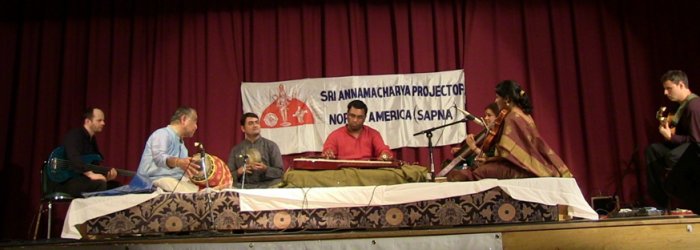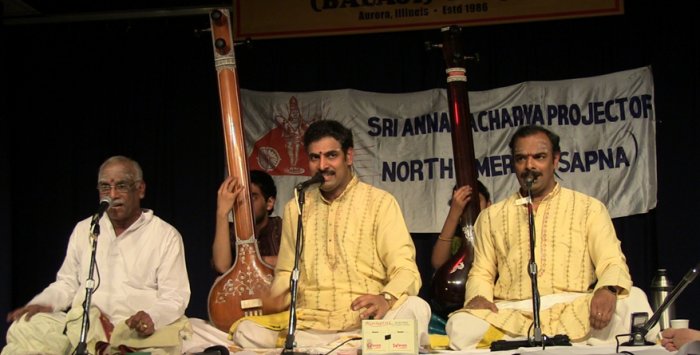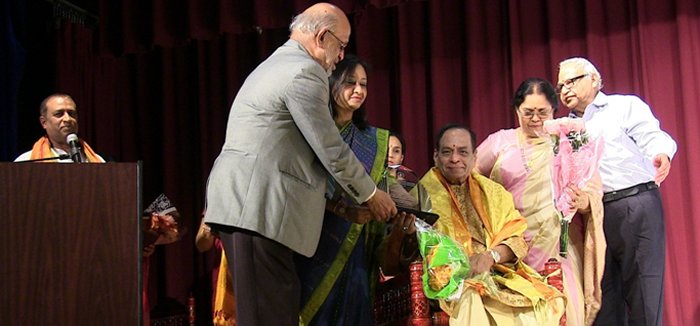
|   |

|   |
Chicago celebrates sounds of the veena May 14, 2013 The 5th three-day veena festival held in Chicago (April 26 - 28) curated by SAPNA (Sri Annamacharya Project of North America) was ample proof of the patronage classical art enjoys – particularly instrumental music of the likes of veena, chitravina, and other ancient acoustic instruments. The festival was dedicated to the loving memory of Dr. Sripada Pinakapani and legendary violinist Lalgudi Jayaraman.  Anyone in the Carnatic music firmament can tell how deeply joyful and embellished a concert can be with Trichy Sankaran at the helm of a delightfully soulful percussive recital. K V Gopalakrishnan on the kanjira in an affectionate and playful rapport with the master mridangist, matching repartees in Khanda nadai – and their tani avartanam was a brilliant display of math, clarity of sound and magical artistry. Akkarai Subbulakshmi on the violin showed great ease and aplomb handling the instrument, responding to the main artiste with refinement, grace and elegance. Earlier in the day, Rajeswari Pariti along with her son Ravi Pariti and grandchildren Divya and Nitya Pariti presented a melodious veena concert – to see three generations of veena artistes on one stage was indeed heartening. The second part of the evening was entitled “Strings in Fusion” featuring compositions of Chitravina Ravikiran, Kalyani-Keeravani Suite and Behaag Thillana. Joining Ravikiran was Saraswathi Ranganathan on the veena, Carlo Basile on the guitar and Greg Nergaard on bass. Saraswathi’s expressions on the veena were replete with enjoyably refreshing artistic nuances while “Melharmony” inspired strums-slides of Carlo and Greg perfectly complemented the ambience. The melodic combination of the veena and chitravina (fret and fretless) interlaced with harmonic chords from flamenco guitar and melodic slide bass was a treat to the world music connoisseur. Both compositions were soaked in raga bhavam, solo blitzkriegs, a generous dash of “Melharmony” - keeping the interpretational sensitivity of Carnatic music, yet bringing in the harmonic beauty of Jazz Flamenco grooves. This endeavor is part of SAPNA’s goal to keep up tradition while presenting innovation, and giving excellent opportunity to deserving local (Chicago) artistes. Continuing along the success of day one, the second day opened with veena presentations of students from Dr. Jaishri Prasad’s school of music. It was a delight to see children wield the instrument with confidence and pride playing the Kalyani Malika Thillana. Dr. Jayshri Prasad’s concert was a mellifluous display of the Mysore bani. Saraswathi Rajagopalan gave a well proportioned pleasing veena concert. Youngster Ahtrey Nadhan, a disciple of Shrimushnam Raja Rao, accompanied the veena artistes with an eloquently refined touch on the mridangam. The highlight of the day was felicitation and ‘Srikala Purna’ title award to Malladi Suri Babu, father of the famous vocalists Malladi Brothers, Rama Prasad and Ravi Kumar.  The concluding day began with a euphonious Hindolam raga and Thillana presentation by Neeladevi, a student of Veena Srinivas of India. Students from Vasanthi Iyer’s School of Music in an excellent exhibit of team work sang and played Swati Thirunal’s Dhanasree Thillana. Barely a teenager, Saatvik Gurupalli showed that he could handle the veena with ease while playing Thilang Thillana. Ensemble of Ragas students showcased a sublime vocal and veena arrangement for presenting Dr. Balamurali Krishna’s thillana Jaya Ragamalika, a composition with shruthi and graha bhedam, wonderfully handled by the students. This was followed by an enjoyable sitar - veena jugalbandhi with Saraswathi Ranganathan on veena and Indrajit Banerjee on sitar, Dhananjay Kunte on tabla and Ganapathi Ranganathan on mridangam. While sitar presented a gratifying Desh raga, the veena answered with gamakam filled folk-tinged musings on Kedaragowla, a close Carnatic equivalent with most notes of Desh, yet sounding completely different in mood and flavor. It was well received by the audience. Upcoming veena artiste Arthi Nadhan commendably adhered to classicism in her exposition of Khamas. Vikram Sundara Raman rendered a good vocal concert with veena as accompaniment. Rajeswari Pariti on the veena sketched out Kaapi ragam in its beauteous form in typical Andhra bani to the competent accompaniment of Ethirajan Ramanujan while Rama Gurupalli laid out a very melodious Mishra Shivaranjani Thillana. Yet another talented youngster Sanjay Subramaniam, a student of Guruvayoor Dorai, ably accompanied her on the mridangam. Earlier in the day, there was a panel discussion led by Dr. Shelly Kumar on ‘Veena as an accompanying instrument.’ Some interesting points were brought out by participants who were teachers from the Chicagoland schools facilitated by Dr. Saradapurna Sonty. The evening began with SAPNA honoring Dr. BMK with Lifetime Achievement Award. Interestingly, Dr.BMK inaugurated the first year of SAPNA, and by serendipity, he was here to celebrate their 25th anniversary. Consul General of India, Ms. Mukta Tomar, graced the occasion as Special Guest for the evening.  The grand finale was an indescribably outstanding one-of-a-kind vocal performance by Dr. M Balamurali Krishna. Rasikas half his age, felt older than him! At 82 years, such is BMK’s energy, passion and his voice forays that always bear his peerless style, leaving the audience thirsting for more. The concert was clearly aimed at the mainstream audience featuring most of his popular numbers. “Naada Tanumanisham” in Chittaranjani was appropriately sung first followed by “Amma Anandadaayini,” his own composition in Gambhira Nattai, till date matchless in its form and presentation. “Vatapi Ganapathim,” although a very common krithi, Dr. BMK has the knack of interpreting the same krithi in a subtle yet powerfully expressive way that gives it a completely different signature. “Devadi Deva” with alapana in SunaadaVinodini and “Samajavaragamana” with an articulate Hindolam alapana: the highlight of these was the effortless tristhaayi sancharas with deep voice intonations. The unexpected yet deliberate glides between the octaves showed an unmatched command and mastery over his smooth unmistakable voice, despite his age. “Sogasu nee sommu Kalyani Ragini” in Kalyani ragam, one of the many compositions of Dr. BMK was sung with such romantic abandon that “Sogasu nee Kalyani Ragini” and raga Kalyani seemed to intertwine in their raga bhavam, sahitya bhavam, permeating seamlessly into the portal of nada brahmam transcending the ordinary. A musical silence, an ecstatic ‘wah!’, a hearty smile, a soul dancing with joy, even goose bumps were some of the manifestations of the enthusiastic response from rasikas - the energy was palpable. Great maestros immerse themselves in music and in doing so weave a tapestry of spiritual energy that transforms our experience from the ordinary and mundane to the divine and sacred. Belief in oneself, confidence in presentation and an abject surrender to musical saadhana are some of the virtues any aspiring learner can observe from Dr. BMK. Audience choice krithis, the haunting “Pibare Ramarasam,” an ever appealing “Paluke Bangaramayina” concluded the magnificent concert and drew the curtains on the glorious three-day veena festival that was held at Balaji Temple Aurora and at the Hindu Temple of Greater Chicago in Lemont. 25 years and going strong, SAPNA run by Dr. Saradapurna Sonty and Dr. Sriram Sonty, gave the intangible gift of “naadaapavarga” to classical music rasikas of Chicago. The sound of the veena is still resonating….until next year... |